The City of Yarra publishes several policy documents on its parking page, including:
- Parking Management Strategy, dated 2021
- Parking Restriction Guidelines, dated March 2020
- Parking Permit Policy, dated October 2014
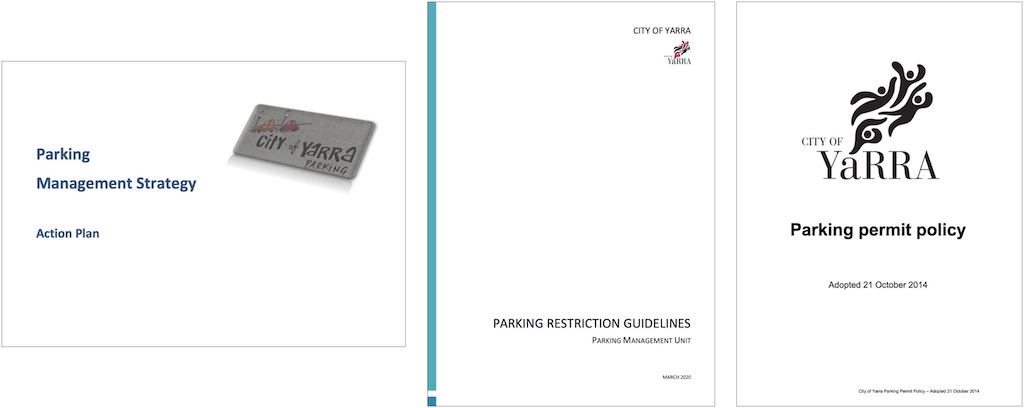
All of these documents sit below the Social Justice Charter and the Council Plan, and should align with other adopted policies such as the Pricing Policy and the Climate Emergency Plan. This article explores some contradictions and inconsistencies between the various documents, and offers some solutions.
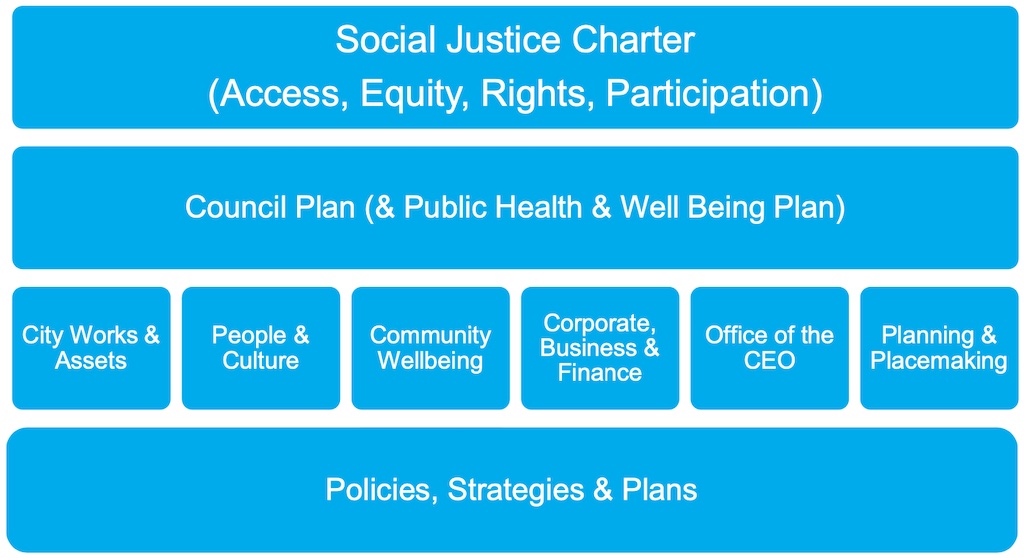
Social Justice
The three parking documents fail to align with the Social Justice Charter because they fail to manage parking in a manner that enables people who need to drive from being able to reliably find a park and avoid a fine. People who need to drive and park includes some people for work, some people with disabilities, and some people owing to age or frailty. To deliver social justice for people who need to drive, parking needs to be managed in accordance with an occupancy target, which means that council needs to adopt paid parking with demand responsive pricing.
Similarly, the three parking documents fail to align with the Social Justice Charter because they fail to manage parking in a manner that delivers equity of access to people who can’t drive or can’t afford to drive, such as children, youth, or some people on low incomes. To deliver social justice for people who can’t drive, street space needs to be reallocated away from parking and toward walking, cycling and improved public transport stops. In turn, this means that that the demand for the remaining parking bays needs to be balanced with supply, which means that council needs to adopt paid parking with demand responsive pricing.
Council Plan
The three parking documents fail to align with the Council Plan, which states that council is committed to creating a city that is accessible to all, irrespective of levels of personal mobility, to support a fulfilling life without the need for a car. To deliver on the Council Plan, street space needs to be reallocated away from parking and toward walking, cycling and public transport stops. In turn, this means that that the demand for the remaining parking bays needs to be balanced with supply, which means that council needs to adopt paid parking with demand responsive pricing.

Pricing Policy
The three parking documents fail to align with council’s adopted Pricing Policy because although on-street parking is subject to competitive neutrality (it competes with private off-street parking), council fails to charge market rates (as required by the policy). To comply with the Pricing Policy, council needs to adopt paid parking with demand responsive (market) pricing.
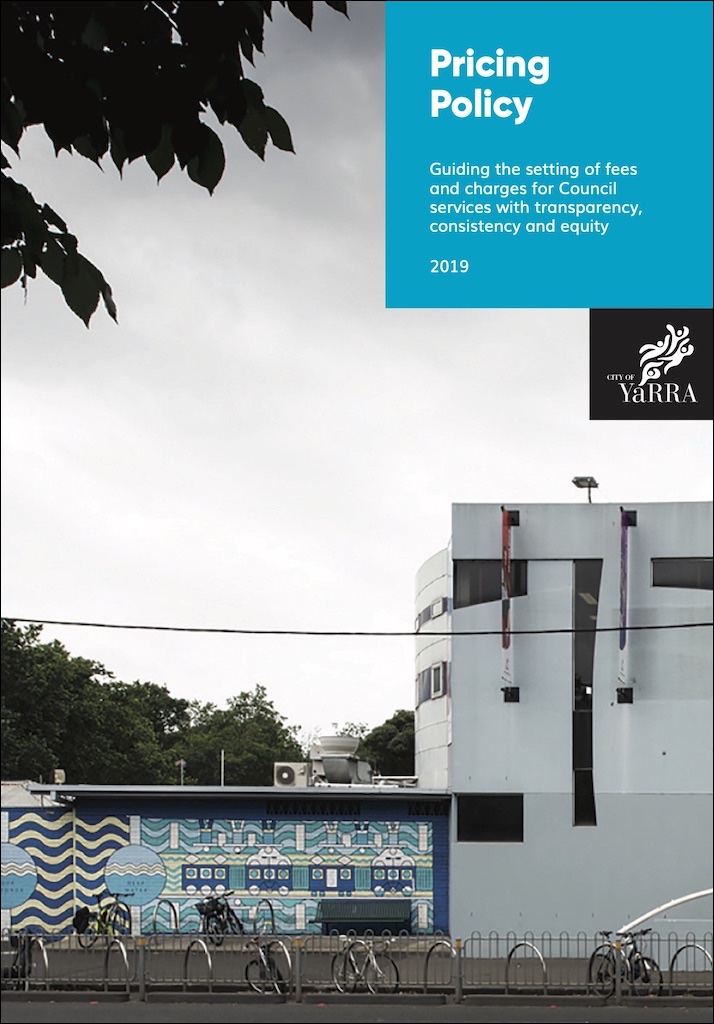
Climate Emergency Plan
The three parking documents fail to align with council’s adopted Climate Emergency Plan because they continue to promulgate a subsidy of carbon pollution. Parking is almost 100% occupied by vehicles that emit carbon pollution, and parking is subsidised because it is offered at prices that are well below market rates. The International Energy Agency has recently stated, in their Net Zero by 2050 report, that we need to rapidly decarbonise our transport systems. The best way to do this in the inner city is to encourage mode shift to zero or low emission modes such as walking, cycling, and public transport powered by 100% renewable energy. Council can encourage this transition by pricing parking at market rates.

Parking Management Strategy – Vision
The three parking documents fail to align with the vision stated in the Parking Management Strategy:
Parking is managed by the City of Yarra to promote sustainable transport solutions…
Parking Management Strategy, dated 2021
To promote sustainable transport solutions, street space needs to be reallocated away from parking and toward walking, cycling and public transport stops. In turn, this means that that the demand for the remaining parking bays needs to be balanced with supply, which means that council needs to adopt paid parking with demand responsive pricing.
Parking Management Strategy – Goals
The three parking documents fail to align with the goals stated in the Parking Management Strategy:
1. Reduce the number of cars needing to park in residential streets;
2. Enable a reduction in the road pavement space used for parking where a community benefit can be achieved particularly where pedestrians, cyclists, public transport and persons waiting for public transport will benefit; and
3. Plan and manage transport and urban development to minimise the need for people to have to drive cars so that the demand for parking is contained and managed effectively.
Parking Management Strategy, dated 2021
To deliver on Goal #1, council needs to improve infrastructure for walking and cycling, so that more people are comfortable choosing these modes over driving. Again, this means that street space needs to be reallocated, and that council needs to adopt paid parking with demand responsive pricing.
To deliver on Goal #2, to enable a reduction in the road space used for parking, council needs to manage the demand for parking, which means that council needs to adopt paid parking with demand responsive pricing.
To deliver on Goal #3, to plan and manage transport and urban development, council needs to eliminate parking minimums from the Yarra Planning Scheme.
Parking Management Strategy – Principles
Principle #1 sets the strategy up for failure, because it adopts free, time-restricted parking.

This invites drivers to elude the restrictions by swapping the location of their parked cars every two or four hours. Because the cars have technically been moved, they don’t receive a fine. In addition, adopting free, time-limited parking contradicts section 3.5.2, which requires paid parking.
A key principle endorsed by Council for managing parking in Yarra is that all visitors to our city should contribute to the cost of maintaining and providing the parking infrastructure they use.
Parking Management Strategy Section 3.5.2
Principle #4 is also destined for failure, because council gives away many parking bays for free, or effectively for free via residential permits that cost 11 cents per day. Offering a highly valuable product or service for free or almost free leads to a sustained increase in demand, which makes it difficult to reallocate space to deliver a safe and accessible street environment.

Principle #13 is destined for failure, because free, time-restricted parking is difficult to enforce. Drivers escape fines by swapping the location of their cars every two or four hours, effectively occupying the bays for the whole business day.

Principle #14 has not been realised, instead council has done the opposite and placed a constraint of only 283 bays for car sharing. Council claims that a larger allocation was not supported by the community, while failing to acknowledge the policy interdependencies – an increase in demand created by giving away parking for free or almost free, which incentivises people to lobby against space for car sharing. If instead fewer people parked on-street because council charged demand responsive or market rates, then more people would lobby for the value offered by car sharing.

Principle #15 has not been realised, in contrast council still has parking minimums in the Yarra Planning Scheme.

Parking Management Strategy – Disability Access
Council has failed to deliver equity of access for people with disabilities who need to drive and park. Council could easily increase the number of disabled parking bays, simply by reallocating space.
Parking Management Strategy – Paid Parking
The strategy makes a completely unsubstantiated claim in section 3.5.3, that paid parking will not be suitable for all streets, most likely because it conflates paid parking with metered parking:
Paid parking is only one of the “tools” Council has to manage the scarce parking resource. It will not be suitable for all streets and so the following criteria has been developed to help officers when they are considering the installation of ticket machines:
Parking Management Strategy section 3.5.3
Metered parking is not the only form of paid parking. Paid parking can be achieved using digital permits that are purchased via an app, or online. An example is ParkDC in Washington DC:
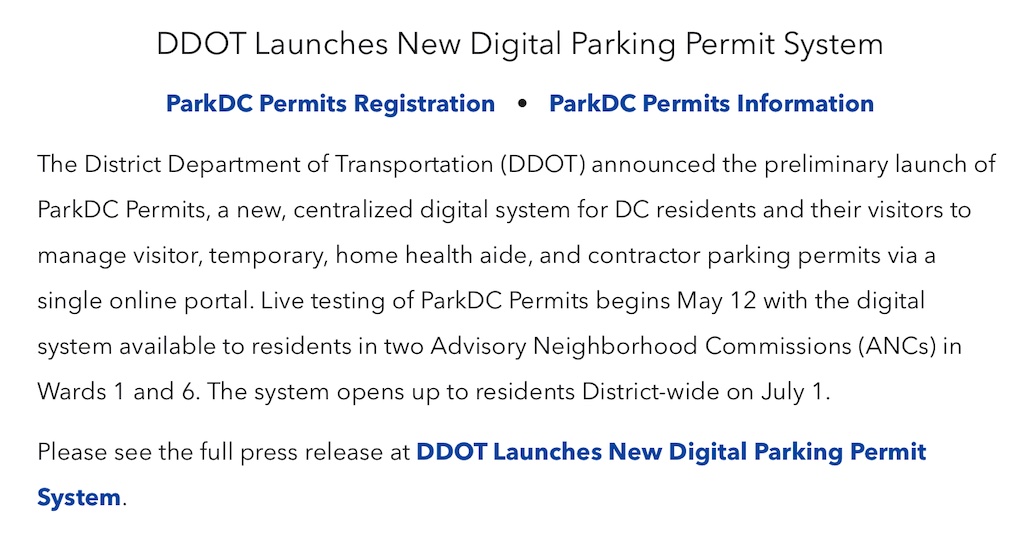
Parking Management Strategy – Review
The strategy highlights the failure of council to reform the parking strategy, pointing out that many issues were raised by new councillors in 2012, but that a forum/workshop wasn’t held until December 2019. This highlights the failure of Council to address parking while the problems have got worse.


Parking Restriction Guidelines – Background
The Parking Restriction Guidelines make a completely unsubstantiated claim, most likely because it conflates needs with desires.
The City of Yarra experiences a significant demand for on street parking such that it is often impossible for Council to meet the needs of all stakeholders.
Parking Restriction Guidelines Section 1
Streets Alive Yarra contends that it is possible for council meet the needs of stakeholders if the demand for on street parking is managed via pricing. The advantages of market-based solutions to the allocation of scarce resources have been understood for 250 years (since Adam Smith) yet council fails even to consider these advantages.
Parking Restriction Guidelines – Process
The Parking Restriction Guidelines correctly identifies an evidence based approach using parking occupancy, but fails to use demand responsive pricing as a means of delivering the occupancy target.
Parking Restriction Guidelines – maximum 4P
The Parking Restriction Guidelines state that the maximum time restriction to be installed is 4P. However, in May 2021 council failed to follow these guidelines when they installed 8P parking bays at Princes Hill Secondary College.
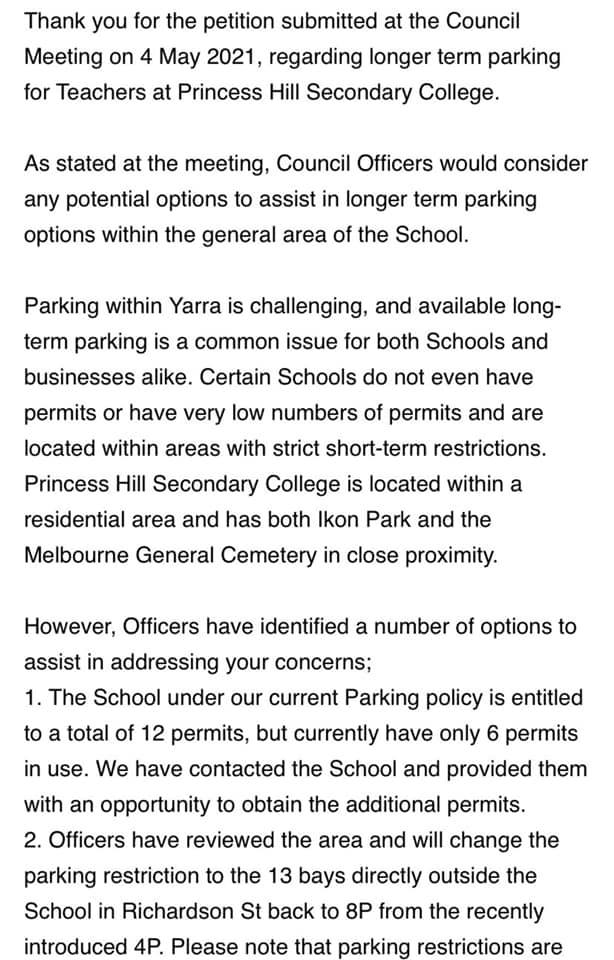
Parking Permit Policy – perverse incentive
The Parking Permit Policy includes a perverse incentive that could lead to some businesses removing an off-street car parking bay so that they are eligible for multiple on-street parking permits. A better solution is to treat all businesses equally – with equal rights to access public land for car storage, irrespective of whether they have allocated any part of their private land for off-street parking.
9.1. No Business Permits are issued where any off-street parking is available.
Parking Permit Policy
Parking Permit Policy – discrimination
The Parking Permit Policy discriminates between different types of workers. Council staff, school staff and volunteer staff of non-profits are given preferred treatment, suggesting that council values their work more than the work of others. This isn’t tenable – council should not be making value judgements about the value of one role compared with another, or discriminate between different classes of work. All workers and commuters should have equal rights to access public land for car storage.
13.1. Council staff permits are issued to City of Yarra staff located at Town Halls or other Council facilities across the municipalities and allow staff to park in the immediate vicinity of their place of work and be exempt from time restrictions.
Parking Permit Policy
17.1. Schools and Not for Profit Community Organisations Permits are issued to paid staff of Schools and Not for Profit Community Organisations.
Parking Permit Policy
Discussion
The core issues of social justice were discussed in more detail in Streets Alive Yarra’s recent submission to council in response to a petition from teachers at Princes Hill Secondary College asking for free permits. The submission can be summarised as:
- Some people, including some teachers, need to drive, and it’s a core issue of social justice to ensure these people can find a park and avoid a fine.
- Council can’t offer free all-day parking to just one cohort of people, such as teachers from one school, because this discriminates against other workers, and council is not in a position to make value judgements about the the worth of one role compared with another.
- Council can’t offer free all-day parking to all workers, because there aren’t enough car parks to go around.
- Thus, to deliver social justice for teachers who need to drive and park, council needs to offer user-pays permits, priced at market rates, similar to those offered by the City of Moreland.
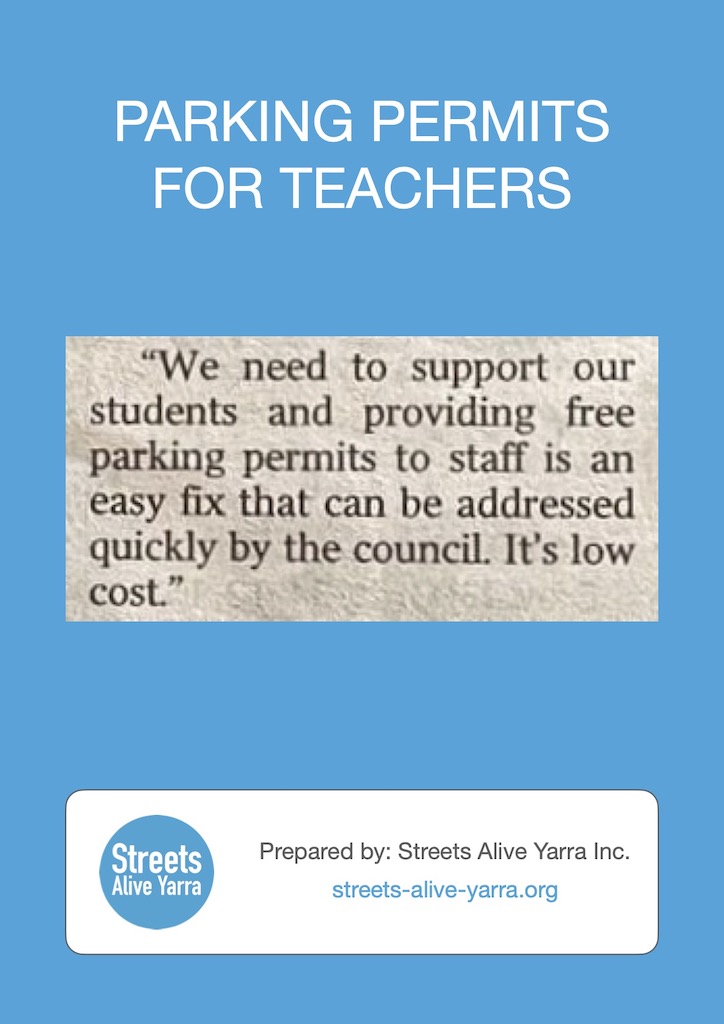
Solution
Yarra’s parking policies haven’t kept up with either our increasing population or the progress of technology. Council has failed to update its policies to reflect best practice or to deliver social justice. The solution is for council to standardise on:
- permit only parking bays, with
- digital permits, purchased via an app or online, and
- enforcement using automatic number plate recognition.
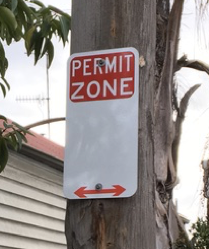
Together, this would enable demand responsive pricing targeting 85% occupancy, backed by effective enforcement. In this proposal, two types of permit only zones are defined – shopping and residential. Permit only zones to support shoppers are located near shopping streets, while permit only zones to support residents cover the remaining area of each neighbourhood.
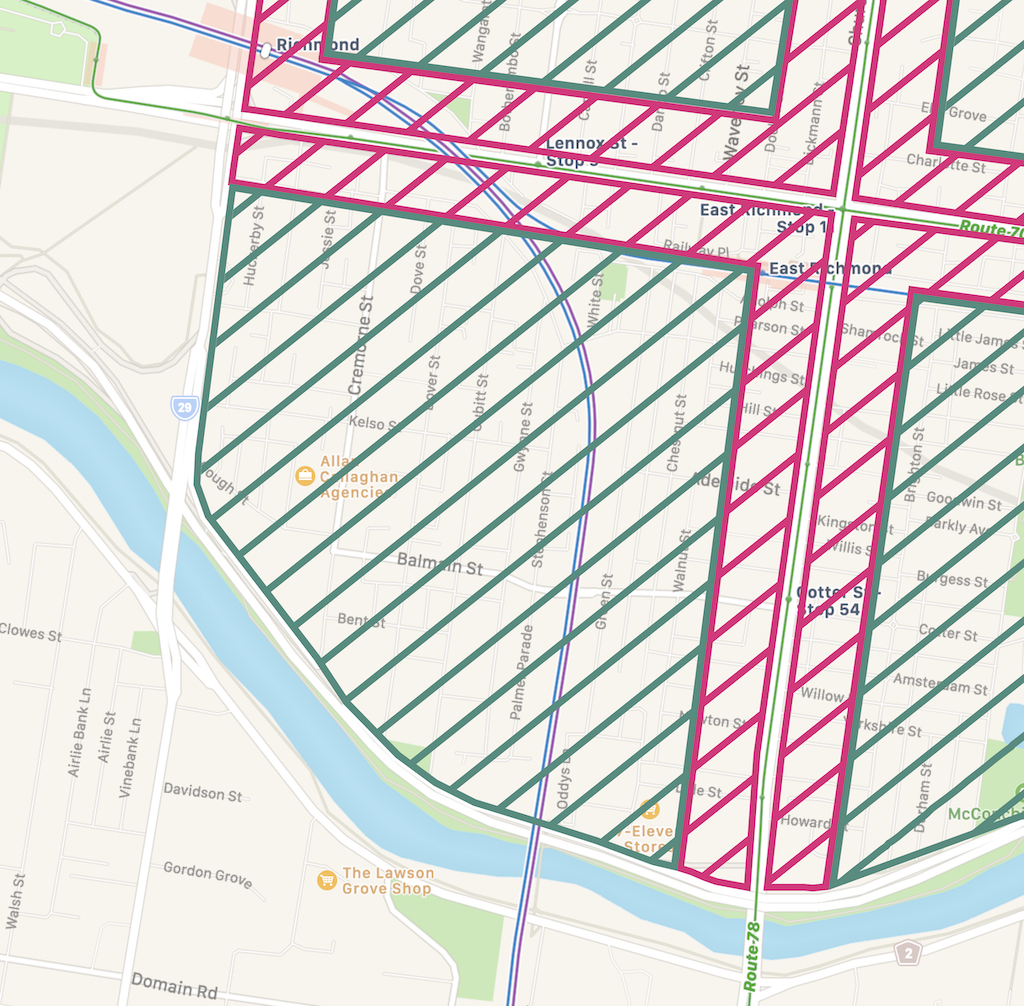
Permits can be sold at multiple pricing levels, to reflect established pricing for residential permits, while also reflecting market pricing for commuters.
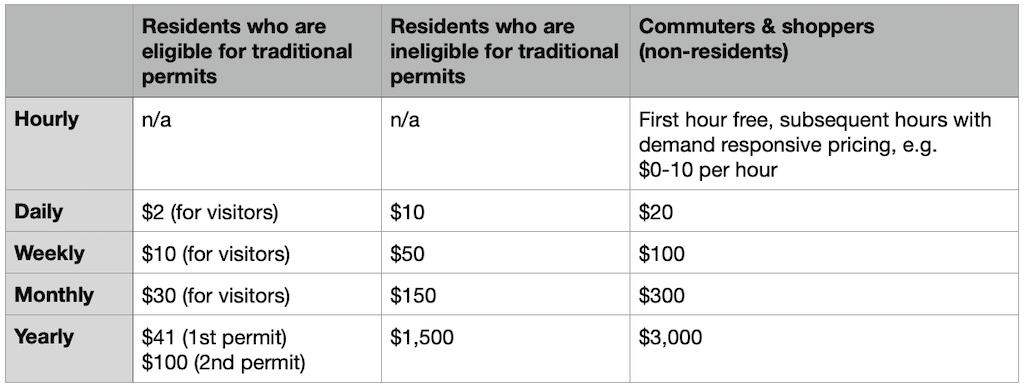
Enforcement can be effective by using vehicles fitted with automatic number plate recognition. Parking enforcement officers can drive along each high-demand street in Yarra several times per day, with the system automatically comparing number plates with the online record of digital parking permits. Vehicles either have a paid permit for that location and date, or they don’t.
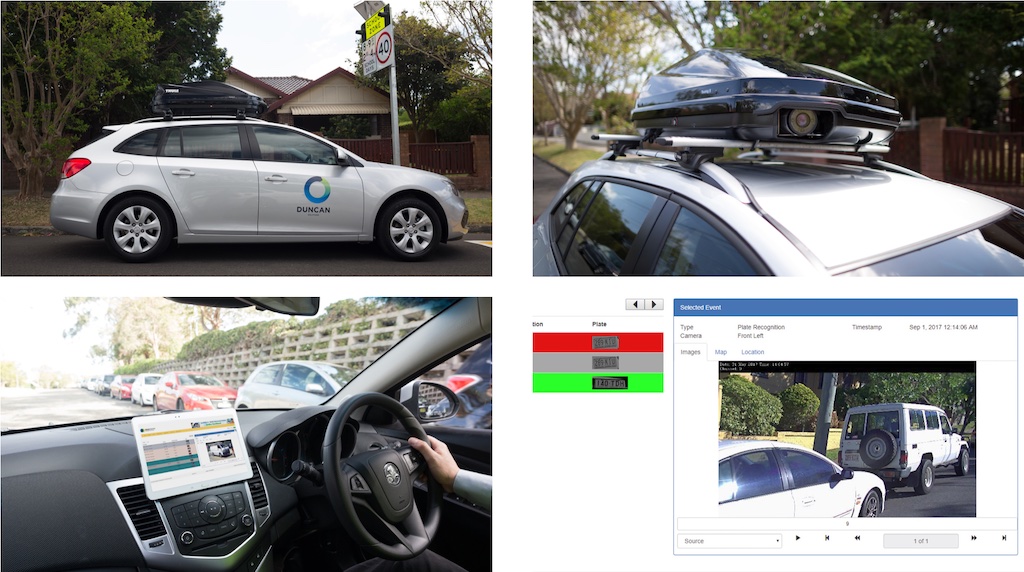
Conclusion
Yarra’s parking policies (Parking Management Strategy, Parking Restriction Guidelines, Parking Permit Policy):
- fail to align with Yarra’s Social Justice Charter, Council Plan, Pricing Policy or Climate Emergency Plan
- fail to be internally consistent, i.e. align with each other
- fail to align with best practice
- haven’t kept up with demand caused by our increasing population
- haven’t kept up with the progress of parking management technology
Council can fix these issues relatively simply, as other cities around the world have demonstrated, by adopting permit parking, digital permits, non-discriminatory policies, and effective enforcement.
Published 30th May 2021
